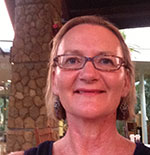- How did you learn about the program and what motivated you to enroll?
-
I learned about the program while pursuing work at the BC Cancer Agency. It was good timing as I was not sure about my professional development plans for that year. I saw the program as a good opportunity to development new skills I could use in my work where I have a Population Health related role. Although I have experience in this area, I had no formal training working with layered data sets. The Working with Administrative Data course outline looked good as it included making a data dictionary and use of admin data; the other courses looked very relevant to my work needs too.
I decided to take the program as I was looking for in-Canada certificate level courses I could take to further advance my knowledge in preparation to pursue further graduate level training. As a research coordinator based in Kelowna, I did not have many local professional development opportunities in the area of population health so the online structure of the program was very beneficial for me.
- Tell us about your course experience. What skills did you develop and which courses provided the greatest benefit to you?
-
Overall the program was really a very good experience. The courses I took included: PHDA 01 Working with Administrative Data, PHDA 02 Epidemiological Statistics, PHDA 03 Population Health and GIS and PHDA 06 Health Services Program Monitoring and Evaluation. I wouldn’t rate one course as better than the other as I feel they all contributed very well to my overall learning. I am happy that I took PHDA 01 before PHDA 02 as I didn’t have strong SAS skills and PHDA 01 includes an introduction to SAS skills from the very beginning. I would therefore recommend that if people don’t have SAS experience they should take PHDA 01 before PHDA 02. I also found that PHDA 06 was one of the most practical courses. I was able to apply the skills that I was learning to a program evaluation that I was leading within the Infection and Control Department at Interior Health Authority. Being able to directly apply the knowledge I was gaining in the course made an amazing difference to my skill development. Overall, it was a great learning experience and really provided valuable overarching guidance to my work. It supported my work in finalizing a questionnaire for stakeholders and reporting findings to Interior Health.
- How have you been able to (or how do you plan to) apply your new skills in your work/research?
-
One of my ongoing projects at work involves assessing trends in surgery wait times for lung cancer patients. This work involved analysis of local data as a pilot project looking for trends in regional variations; I used techniques learned in PHDA 01 to facilitate this analysis.
I also found the PHDA 02 Epidemiological Statistics course really assisted my skill development in multivariate modeling. Similarly, the PHDA 03 Population and GIS course provided me with a skill set that I would have had difficulty learning on my own. I was able to apply training from these two courses to some of my current work that is assessing how we can improve quality of life related follow-up for British Columbian cancer patients after they have received their treatment. For example, I was involved with a study that looked at using internet technologies as a means of following up with patients that had been treated with radiation for their prostate cancer. We were interested in seeing how follow-up for British Columbian patients differs with different levels of access to resources based on their geographical location. Our project showed that internet based means of health monitoring might be a feasible option, although participation rates were much lower in regional areas with limited access to high quality wireless internet connectivity. The analysis would have been much more difficult without the skills that I had learned in the PHDA program.
- What do you think were the strengths of this program? Please provide examples.
-
Anyone looking to build on their experience in Population Health in a practical sense or those working in the field would find this program an excellent opportunity. I would also recommend the program to those working on their Masters or PhD’s in areas of Population Health. I found the structure of the program was good. The workload wasn’t more or less than I expected. If individuals haven’t taken an online course before, they may feel a heavier workload initially. I think the 12 week time frame for each of the courses was good. Extending the time beyond 12 weeks could get confusing and less than 12 weeks would not be enough time to cover all the course content adequately. For myself, I was very glad to complete the certificate within one year.
- Would you recommend this program to others? If so, what recommendations/suggestions would you give those interested in applying to this program?
-
I would definitely recommend this program to others interested in working in this field and I have recommended the program to several individuals, including graduates pursuing a career tract in health analytics and medical statistics/epidemiology. For those with an interest in health analytics and with a technical background in computer science, I think the PHDA courses can support the development of more practical and applied clinical tools and skills. For those with an interest in epidemiology or health services research, the teaching on use of large databases and study design was very informative. In addition, the PHDA 06 course assists with learning useful skills for individuals wishing to transfer from a clinical to an administrative or quality improvement role.
For those who are interested in applying to the program, I would recommend that they look at the course outlines and choose ones that are relevant to their work place or educational needs. For those working on their PhD’s or Masters, they could look into how some of the courses might be able to be part of their studies. I think for graduate students, many of the courses could be really helpful. It is a unique program for individuals working in British Columbia as it enables individuals to use BC specific data.

